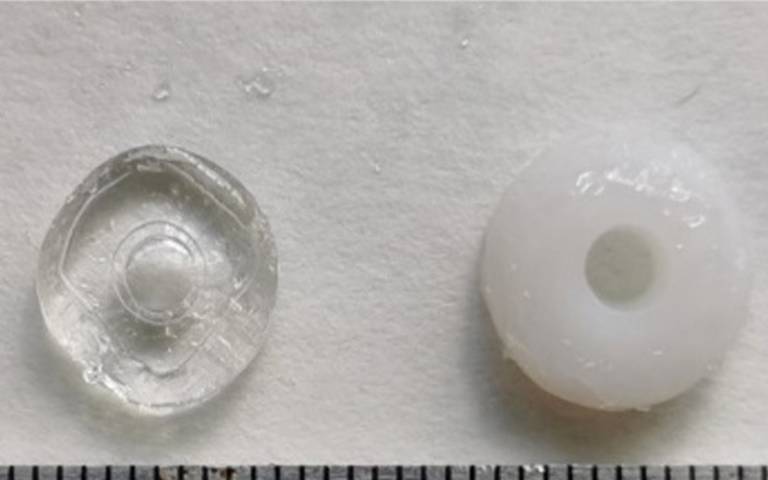
via UCL
Medicines 3D-printed in seven seconds
The findings published in the journal, Additive Manufacturing, improve the prospects of how 3D printers could be integrated into fast-paced clinical settings for on-demand production of personalised medicines.
For the current study, the researchers loaded printlets (printed tables) with paracetamol, which is one of many medicines that can be produced with a 3D printer.
One of the leading techniques for 3D printing is vat photopolymerisation, which affords the highest resolution for complexity at microscales, and also suits many medications as it does not require high heat. For printing medicines, the technique uses a resin formulation, constituting the required drug dissolved in a solution of a photoreactive chemical, activated by light to solidify the resin into a printed tablet.
But vat polymerisation has been hampered by slow printing speeds, due to its layer-by-layer approach.
Here, scientists have developed a new vat polymerisation technique that prints the entire object all at once, reducing the printing speed from multiple minutes to just seven to 17 seconds (depending on the resin composition selected). This works by shining multiple images of the object viewed at different angles, onto the resin. The amount of light shone gradually accumulates, until it reaches a point at which polymerisation occurs. By adjusting the intensity of light at different angles and overlaps, all points of the 3D object in the resin can reach this threshold at the same time, causing the entire 3D object to solidify simultaneously.
The currently study is led by Professor Abdul Basit (UCL School of Pharmacy), and also involved researchers at Universidade de Santiago de Compostela as well as FabRx, a UCL spin-out co-founded by three members of the UCL research team.
The Basit lab has previously developed 3D-printed polypills to help people who need to take multiple medications each day, as well as pills with braille patterns to help the visually impaired.
Original Article: Medicines 3D-printed in seven seconds
More from: University College London | University of Santiago de Compostela
The Latest Updates from Bing News & Google News
Go deeper with Bing News on:
3D-printed medicines
- University’s ‘futurists’ encourage audience to embrace curiosity during Imagine RIT symposium
Imagine RIT’s Futurists Symposium invites industry experts to talk about the blending of technology, the arts, and design.
- Gorilla at Cincinnati Zoo gets world’s first 3D-printed titanium cast after injury
A gorilla at the Cincinnati Zoo in Ohio received the world’s first 3D-printed titanium cast Friday after being ... and anesthesiologists from the University of Cincinnati College of Medicine. The zoo, ...
- Medicine, Manufacturing, Molecules: DoN shines at Navy League STEM Expo
Two middle school-aged children knelt next to a pair of life-like mannequins — one a full-body figure, the other a lower torso with its right leg severed below the knee, ...
- Global 3D Printed Drugs Industry
Global 3D Printed Drugs Industry is expected to reach US$ 742.88 Million in 2032, growing at a CAGR of 9.2% From 2022 to 2032 ...
- NFL draft prospect Walter Rouse was first an aspiring surgeon at Penn’s summer program
Rouse in an offensive lineman who's met with the Eagles as likely a Day 3 draft pick in the NFL draft. He also dreams of being a doctor.
Go deeper with Google Headlines on:
3D-printed medicines
[google_news title=”” keyword=”3D-printed medicines” num_posts=”5″ blurb_length=”0″ show_thumb=”left”]
Go deeper with Bing News on:
Personalized medicines
- Personalized 'cocktails' of antibiotics, probiotics and prebiotics hold promise in treating IBS, pilot study finds
Personalized "cocktails" of antibiotics, probiotics and prebiotics hold great promise in the treatment of a common form of irritable bowel syndrome (IBS), according to research presented at the ESCMID ...
- 'Despite promise, personalized medicine for head and neck cancers facing hurdles'
Improved efficacy: By identifying specific mutations driving tumour growth, personalized medicine allows for targeted therapies that have a higher success rate compared to ‘one-size-fits-all’ ...
- Examining the impact of gene-based breeding on agriculture and medicine
A research team has demonstrated that gene-based breeding (GBB) offers a transformative approach to advancing plant and animal breeding, showing remarkable predictability, speed, and ...
- U.S. health care evolving to become more personalized, consumer-focused, research finds
Trends that could impact the market’s future, include the potential for future pandemics, emerging advancements in healthcare technologies and an aging population.
- What do weight loss drugs mean for a diet industry built on eating less and exercising more?
A little over a year ago, the 58-year-old Manhattan resident went on a new weight loss drug called Wegovy. He's lost 30 pounds, and has started eating healthier food and exercising — the habits behind ...
Go deeper with Google Headlines on:
Personalized medicines
[google_news title=”” keyword=”personalized medicines” num_posts=”5″ blurb_length=”0″ show_thumb=”left”]









